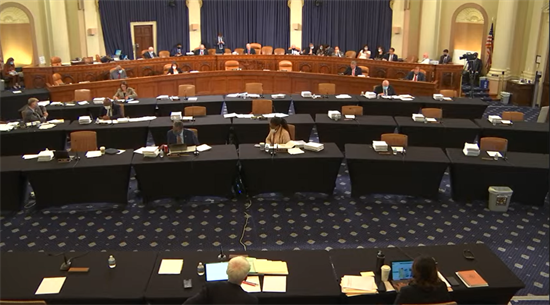WASHINGTON, DC—Today, House Ways and Means Chairman Richard E. Neal (D-MA) released the following statement applauding the Committee’s advancement of its contributions to the Build Back Better Act:
“With close to 40 hours of debate over the course of four days, the Ways and Means Committee has just approved a historic slate of measures to invest in the American family and American economy. These life-changing provisions will level the playing field, expand opportunity, and rebuild our economy to be more equitable and inclusive.
“To my colleagues, the unmatched Ways and Means Committee staff, and the many others who have made this a reality, thank you for your service to the American people.
“This package, coupled with the bipartisan infrastructure plan, represents our firm belief that it’s not just the roads that get you to work that require funding, basic supports like child care and paid leave are also essential features of society worthy of investment. As the broader negotiations continue, I must emphasize that now is not the time to settle for less. The American people are looking to us as members of the Democratic Party to push ourselves and set the highest possible standards for what’s possible. Twelve weeks of universal paid family and medical leave, guaranteed access to child care, strong proposals to combat climate change, and responsibly funding our priorities are just some of the measures that must remain in this package and become law.”
The Ways and Means Committee’s portion of the Build Back Better Act includes measures to:
- Support clean energy investment and deployment and the creation of good, well-paying jobs;
- Extend the extremely impactful American Rescue Plan expansion of the Child Tax Credit, and make permanent the American Rescue Plan expansions of the Earned Income Tax Credit and the child and dependent care tax credit;
- Reinstate Build America Bonds and advanced refunding bonds to provide financing to state and local governments and spur investment in the private sector;
- Expand proven tax credit programs that encourage economic and affordable housing investments in our communities that are most in need;
- Lower prescription costs for Americans by allowing the HHS Secretary to negotiate for lower drug prices;
- Provide immediate coverage for Americans in the Medicaid coverage gap;
- Extend the American Rescue Plan’s expanded premium tax credits to help lower health insurance costs;
- Mitigate wealth inequality and strengthen the progressive power of our tax system by increasing the individual tax rate, increasing the top capital gains rate, and adding a modest surtax on the highest-income taxpayers;
- Level the playing field by cutting taxes for our nation’s smallest businesses and bringing the corporate rate to 26.5 percent;
- Promote global competitiveness while ensuring that multinational corporations pay their fair share by better harmonizing the U.S. corporate minimum tax rate with the rate agreed to by over 130 countries in international negotiations; and
- Invest in tax fairness by better equipping the IRS with updated technology and the human capital necessary for the complex audits of high-wealth individuals.
Expand workplace supports by:
- Providing up to 12 weeks of universal paid family and medical leave for all U.S. workers;
- Reauthorizing the Health Profession Opportunity Grant (HPOG) program to strengthen this effective health care job training program and making it available nationwide; and
- Investing in child care access and equity by:
- Ensuring that parents and caregivers have the most useful and up-to-date information on available child care options and helping them easily apply for slots;
- Funding the construction and remodeling of child care facilities to make them even safer and more aligned with public health guidelines; and
- Raising the wages of child care workers, who currently earn a median wage of $12.24 per hour and often live in poverty.
Strengthen retirement security by:
- Requiring employers without employer-sponsored retirement plans to automatically enroll their employees in IRAs or 401(k)-type plans; and
- Making the Saver’s Credit refundable so that those without any income tax liability are eligible to receive the benefit in the form of a contribution to their retirement account.
Improve elder health by:
- Expanding Medicare coverage to include dental, vision, and hearing benefits, quickly getting new vision and hearing services to beneficiaries in 2022 and 2023, respectively, to eliminate cost and coverage barriers to this care.
Protect the elderly and people with disabilities in nursing homes by:
- Funding elder justice programs that increase support for state and local Adult Protective Services offices and long-term care ombudsman programs to better prevent elder abuse, neglect, and exploitation;
- Addressing the staffing shortages in long-term care facilities by providing funds for recruitment and retention, including wage subsidies, access to child care, tuition reimbursement, and student loan replacement; and
- Improving the accuracy and reliability of the data collected in these facilities to increase transparency for patients and their families, and strengthen the federal understanding of care quality and reimbursement, and study and update staffing – a key predictor of quality and safety.
Modernize and reform the Trade Adjustment Assistance (TAA) programs by:
- Increasing benefits and expanding eligibility to meet the needs of today’s workers under TAA for Workers program;
- Reestablishing the TAA for Communities program to target support and initiate proactive outreach in trade-affected communities;
- Delivering additional funding to the TAA for Community Colleges and Career Training program to better support students served by community colleges;
- Expanding eligibility, improving outreach, and increasing funding for TAA for Firms to assist firms facing competition from abroad; and
- Improving outreach and increasing benefits for TAA for Farmers, which hasn’t received new funding in a decade.
###


